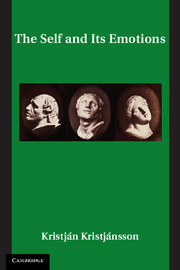Book contents
- Frontmatter
- Contents
- List of Tables
- Acknowledgments
- 1 Introduction
- 2 What Selves Are
- 3 Exploring Selves
- 4 The Emotional Self
- 5 Self-Concept: Self-Esteem and Self-Confidence
- 6 The Self As Moral Character
- 7 Self-Respect
- 8 Multicultural Selves
- 9 Self-Pathologies
- 10 Self-Change and Self-Education
- References
- Index
- Titles in the series
8 - Multicultural Selves
Published online by Cambridge University Press: 05 May 2010
- Frontmatter
- Contents
- List of Tables
- Acknowledgments
- 1 Introduction
- 2 What Selves Are
- 3 Exploring Selves
- 4 The Emotional Self
- 5 Self-Concept: Self-Esteem and Self-Confidence
- 6 The Self As Moral Character
- 7 Self-Respect
- 8 Multicultural Selves
- 9 Self-Pathologies
- 10 Self-Change and Self-Education
- References
- Index
- Titles in the series
Summary
Culture-Specific Self-Concepts?
After having devoted Chapters 6 and 7 to workings of the self that are not essentially related to self-concept, I now pick up the thread from Chapter 5 and resume an exploration of the beliefs that people hold in relation to themselves. Some social scientists resent the word ‘self-concept’, because that word seems to connote that the sets of people's self-conceptions – although obviously token-different from individual to individual – possess some type-universal form or structure. In contrast, a number of empirical findings, recorded by social scientists, indicate that there are two essentially different types of self-concepts abroad in the world – two essentially different sets of self-conceptions, if you like: those of an interdependent self-culture and those of an independent self-culture. What is typically added to the story, then, is that these self-conceptions are conceptually and practically irreconcilable or even incommensurable. Human beings inhabit not a single moral and psychological world but two radically different worlds.
I noted in Section 1.2 how such a culture-specific view of self-concepts threatens to undermine the moral objectivism that is the modus operandi of much of what exists in the name of moral philosophy. The trouble is not so much the existence of self-conceptions that are type-different rather than token-different, but rather the additional assumption that there is no standpoint, practical or ideal, from which those conflicting types could be harmonised.
- Type
- Chapter
- Information
- The Self and its Emotions , pp. 167 - 190Publisher: Cambridge University PressPrint publication year: 2010



